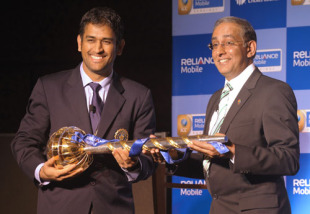 Former New Zealand captain Martin Crowe has said the ICC must settle on two formats - Tests and Twenty20s - to secure the future of the game and market it better. Crowe said attempts to make ODI cricket more appealing would lead to confusion. Instead, he added, the way forward was to provide context to Tests through an annual knockout Test Championship while consolidating the popularity of Twenty20 cricket.
Former New Zealand captain Martin Crowe has said the ICC must settle on two formats - Tests and Twenty20s - to secure the future of the game and market it better. Crowe said attempts to make ODI cricket more appealing would lead to confusion. Instead, he added, the way forward was to provide context to Tests through an annual knockout Test Championship while consolidating the popularity of Twenty20 cricket. "I don't believe three forms will work, I think it is confusing," Crowe said on Media's audio show Timeout, hosted by Harsha Bhogle. "I think new formats, tinkering with rules like silly split innings will only see the global game become another fun park with different rides and attractions. That will just dilute the market and create confusion and chaos.
"They [ICC] have to consolidate the two forms, like we sort of had it in the 70s and 80s with 50-overs cricket and Test cricket. Settle on Twenty20, just see out the life of 50-over cricket and therefore give Test
cricket the chance to stand on it's own as one strong pillar alongside Twenty20." Crowe, who is part of the MCC Cricket Committee, had, in September last year, unveiled plans - which he had presented to the ICC - to make Test cricket more competitive. He proposed a yearly Test Championship comprising seven knockout games, with the top four ranked teams hosting the bottom four in quarter-finals within the Future Tours Programme (FTP) starting 2012 and eventually leading to a title winner.
"We have to get to a point where we are hosting a Test Championship final, and those seven games will become the great focus throughout the course of the year for all the media, the fans and the teams," Crowe said. "It also gives all eight teams a chance, over six days, to win that Test match and progress forward. This way we are also using the FTP and the existing schedule. So, not a lot has to change but just the case of marketing the knock-out format within the FTP."
The Championship, while giving all teams an opportunity to win the title, would also make Tests more relevant, Crowe said. "It firstly gives the worst team a chance to possibly dream that it could make that final. And obviously it gives all the other teams a chance to be crowned every year. That gives Test cricket a meaning, which I think is very important.
"At the moment, you have World Cups, Champions Trophies, World Twenty20, the IPL, the Champions League, all these shorter formats are up and running, dominating the landscape, and they all have a meaning and they all crown a champion. But Test cricket, which is the pinnacle, is the purest and the best form of the game, doesn't have anything."
Crowe also backed the concept of day-night Tests and the use of pink balls to make Test cricket more attractive and draw more fans. "Test cricket needs a lot more work from the marketing point of view, and that's where day-night Test cricket must be trialled soon," he said. "I believe that this will be an exciting part of Test cricket that somewhere along the line within the FTP, somewhere in the world there will be a day-night Test going on. It won't suit every country and the conditions in some countries won't allow it. But I certainly think that in some places it will be wonderful for the local market.
"The MCC has nearly nailed it with the pink ball. It nearly lasts up to 70 overs, and that's pretty close to what you want in a Test match. It's time we tried it, because people will be surprised as to how good it is."
Comments
Post a Comment